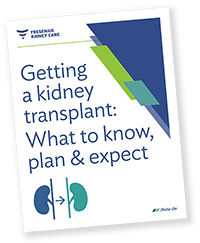Considering Kidney Donation

Do you meet the kidney donor requirements?
Before moving ahead with becoming a kidney donor, you must meet certain basic kidney donation requirements. In general, a kidney donor must:
- Be 18 years of age or older
- Be in good physical and mental health
- Have normal kidney function
If you want to become a kidney donor, you will undergo medical and psychological tests to make sure you’re healthy enough to donate a kidney. You will also go through a series of medical tests at the transplant center to see if you’re a match for the transplant recipient and if you’re ready for surgery. Before kidney donation you'll have:
- Blood tests
- Tissue typing tests
- Antibody tests
- Pre–surgery health screening
Both the donor’s and the potential recipient’s health are considered when screening kidney donors. There are certain medical conditions that can keep you from becoming a kidney donor, such as high blood pressure, diabetes, cancer, HIV, hepatitis, or severe infection. Whether or not the potential donor is a smoker may also be taken into consideration.
Becoming a living kidney donor
If you volunteer to be a living donor for a recipient you know, you’ll have various medical tests done to find out if you’re a good match to be a kidney donor—and if you’re physically and psychologically ready for surgery. If you’re a match and the transplant is approved, you’ll need to make plans for transplant surgery and kidney donation recovery time.
The tests and surgery for a kidney donation are usually covered by the insurance of the person receiving the kidney, though travel expenses and lost income from any missed work may not be covered. Help with the overall cost of donation may be available through the National Living Donor Assistance Program.



Big benefits of kidney donation
It is easy to recognize the benefits of a successful kidney transplant for the person getting the new kidney—better health, a greater quality of life, and a potentially longer lifespan can all have a life-changing impact. There can also be big benefits to becoming a kidney donor. After a kidney donation, the donor often feels deeply rewarded and fulfilled by helping to save someone’s life. Some donors also feel more in touch with their own health and feel committed to taking good care of themselves after kidney donation surgery.
What to know about kidney donation risks and considerations
Here are some things to know before donating a kidney:
- If you decide to donate, the transplant hospital will assign you an advocate who will discuss what typically happens before, during and after surgery and answer all your questions.
- You’ll want to be sure you have adequate medical insurance in case pre-donation screening finds a condition requiring treatment or you have a medical problem after the kidney removal.
- After donating a kidney, it may be more difficult to get life insurance or disability insurance, and your rates may go up.
- Women who donate a kidney and later become pregnant may have more complications in pregnancy.
- When living with 1 kidney, you'll have annual checkups to make sure it’s working well. You’ll also need blood pressure checks every year since it tends to go up slightly after kidney donation.
- It’s common to have strong emotions after donating a kidney. You might feel depressed, even if everything goes well. Getting support after organ donation is important. Contact your transplant center about resources or find a mental health professional that can help.
- It doesn’t happen often, but if you donate a kidney and your remaining kidney fails, you’ll be given high priority on the transplant waiting list for a kidney donation.

What should I expect from surgery and kidney donation recovery
Kidney donation surgery is done under general anesthesia and typically takes about 2 to 3 hours. During the surgery, your medical team will monitor your heart rate, blood pressure, and blood oxygen level. Surgeons usually do laparoscopic surgery, which is less invasive. This type of surgery uses smaller incisions, causes less scarring, and can mean a shorter kidney donation recovery time. Afterward, it’s common to stay in the hospital for a few days.
Once you’re at home, kidney donation recovery involves taking it easy for 3 to 6 weeks, as directed by your doctor. You can start driving again after about 2 weeks. You will need follow-up appointments and then periodic monitoring to make sure you are recovering well and staying healthy.
